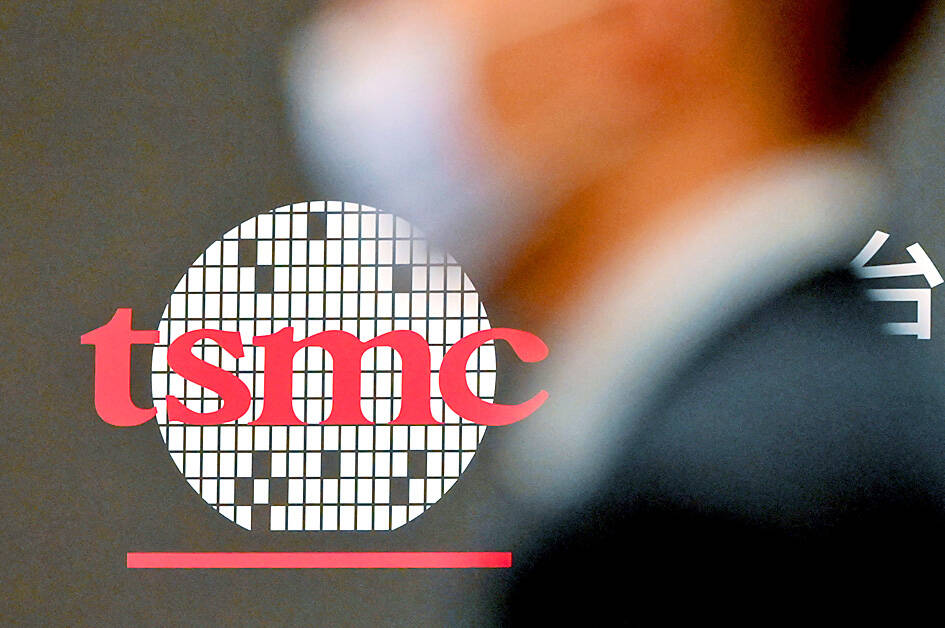Taiwan Semiconductor Manufacturing Co (TSMC, 台積電) regained its US$500 billion market capitalization after investors ramped up bets on tech leaders best placed to ride an anticipated artificial intelligence (AI) boom.
Asia’s most valuable company gained 3.31 percent yesterday in Taipei trading, fueled also by hopes that a post-COVID-19 chip downturn is nearing an end. That took its gain to 32.22 percent so far this year, cementing its position among the world’s 10 most valuable corporations after overtaking Visa Inc last month.
TSMC’s gains contributed about 160 points alone to the TAIEX yesterday, which closed up 261.23 points, or 1.54 percent, at 17,216.60, the highest since April 14 last year, when the benchmark index closed at 17,245.65.

Photo: Sam Yeh, AFP
“Investors remained upbeat about AI development, and TSMC is one of the biggest beneficiaries,” Mega International Investment Services Corp (兆豐國際投顧) analyst Alex Huang (黃國偉) said.
Morgan Stanley this week raised TSMC’s price target, citing higher demand for energy-efficient and low-cost AI custom chip designs.
“With the killer apps of generative AI [such as ChatGPT], we are seeing the semi industry’s growth stage shifting from the mobile computing to the AI computing era,” Morgan Stanley analysts wrote over the weekend. “We view TSMC as a key enabler of future AI semis given its technology leadership.”
Meanwhile, Cathie Wood’s funds have re-entered TSMC and Meta Platforms Inc after nearly a year and a half, as the high-profile manager makes new bets on AI and chips.
Two Ark Investment Management LLC funds, including Wood’s flagship Ark Innovation ETF, bought 174,848 shares of Facebook’s parent company on Monday, while Ark Autonomous Technology and Robotics ETF picked up 98,170 shares of TSMC, data compiled by Bloomberg showed.
Before this, Ark last held the two stocks in the final quarter of 2021.
Ark’s moves came weeks after Wood spoke highly of Meta’s AI strategy and said her decision to drop Nvidia Corp was due to the company facing growing competition.
She added during an interview with Bloomberg last month that she would pivot “to another set of plays.”
Wood’s other AI-related bets include electric vehicle maker Tesla Inc among large caps and UiPath Inc, Twilio Inc and Teladoc Health Inc among smaller names.
The broader rally persists despite warnings that the market might be getting ahead of itself, given the uncertainty over how to monetize AI services.
TSMC, while touting its own potential role in the rollout of AI, has expressed caution over the outlook for the smartphone market that still comprises a significant chunk of its revenue, although company executives have called for a gradual recovery in the second half and a resumption of growth next year.
Last week, TSMC chairman Mark Liu (劉德音) said the chipmaker’s capital expenditure for this year might wind up close to the bottom end of a previously forecast range of US$32 billion to US$36 billion. That is a signal that TSMC, like its rivals across the electronics industry, remain cautious in the face of plunging consumer spending and an uneven post-COVID-19 economic recovery in China.
Additional reporting by CNA

SEMICONDUCTORS: The German laser and plasma generator company will expand its local services as its specialized offerings support Taiwan’s semiconductor industries Trumpf SE + Co KG, a global leader in supplying laser technology and plasma generators used in chip production, is expanding its investments in Taiwan in an effort to deeply integrate into the global semiconductor supply chain in the pursuit of growth. The company, headquartered in Ditzingen, Germany, has invested significantly in a newly inaugurated regional technical center for plasma generators in Taoyuan, its latest expansion in Taiwan after being engaged in various industries for more than 25 years. The center, the first of its kind Trumpf built outside Germany, aims to serve customers from Taiwan, Japan, Southeast Asia and South Korea,

Gasoline and diesel prices at domestic fuel stations are to fall NT$0.2 per liter this week, down for a second consecutive week, CPC Corp, Taiwan (台灣中油) and Formosa Petrochemical Corp (台塑石化) announced yesterday. Effective today, gasoline prices at CPC and Formosa stations are to drop to NT$26.4, NT$27.9 and NT$29.9 per liter for 92, 95 and 98-octane unleaded gasoline respectively, the companies said in separate statements. The price of premium diesel is to fall to NT$24.8 per liter at CPC stations and NT$24.6 at Formosa pumps, they said. The price adjustments came even as international crude oil prices rose last week, as traders

Taiwan Semiconductor Manufacturing Co (TSMC, 台積電), which supplies advanced chips to Nvidia Corp and Apple Inc, yesterday reported NT$1.046 trillion (US$33.1 billion) in revenue for last quarter, driven by constantly strong demand for artificial intelligence (AI) chips, falling in the upper end of its forecast. Based on TSMC’s financial guidance, revenue would expand about 22 percent sequentially to the range from US$32.2 billion to US$33.4 billion during the final quarter of 2024, it told investors in October last year. Last year in total, revenue jumped 31.61 percent to NT$3.81 trillion, compared with NT$2.89 trillion generated in the year before, according to

PRECEDENTED TIMES: In news that surely does not shock, AI and tech exports drove a banner for exports last year as Taiwan’s economic growth experienced a flood tide Taiwan’s exports delivered a blockbuster finish to last year with last month’s shipments rising at the second-highest pace on record as demand for artificial intelligence (AI) hardware and advanced computing remained strong, the Ministry of Finance said yesterday. Exports surged 43.4 percent from a year earlier to US$62.48 billion last month, extending growth to 26 consecutive months. Imports climbed 14.9 percent to US$43.04 billion, the second-highest monthly level historically, resulting in a trade surplus of US$19.43 billion — more than double that of the year before. Department of Statistics Director-General Beatrice Tsai (蔡美娜) described the performance as “surprisingly outstanding,” forecasting export growth